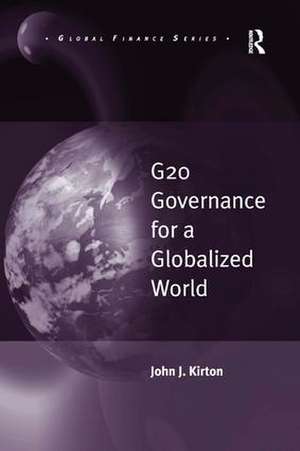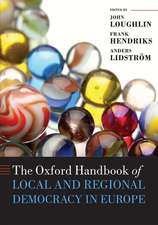G20 Governance for a Globalized World: Global Finance
Autor John J. Kirtonen Limba Engleză Paperback – 28 mar 2015
| Toate formatele și edițiile | Preț | Express |
|---|---|---|
| Paperback (1) | 470.31 lei 6-8 săpt. | |
| Taylor & Francis – 28 mar 2015 | 470.31 lei 6-8 săpt. | |
| Hardback (1) | 1076.01 lei 6-8 săpt. | |
| Taylor & Francis – 19 feb 2013 | 1076.01 lei 6-8 săpt. |
Din seria Global Finance
-
 Preț: 416.22 lei
Preț: 416.22 lei - 17%
 Preț: 184.81 lei
Preț: 184.81 lei - 25%
 Preț: 501.57 lei
Preț: 501.57 lei - 25%
 Preț: 503.19 lei
Preț: 503.19 lei - 18%
 Preț: 1000.27 lei
Preț: 1000.27 lei -
 Preț: 393.52 lei
Preț: 393.52 lei - 25%
 Preț: 769.00 lei
Preț: 769.00 lei - 18%
 Preț: 1005.80 lei
Preț: 1005.80 lei - 18%
 Preț: 1000.27 lei
Preț: 1000.27 lei - 18%
 Preț: 1000.27 lei
Preț: 1000.27 lei -
 Preț: 323.23 lei
Preț: 323.23 lei -
 Preț: 469.34 lei
Preț: 469.34 lei - 18%
 Preț: 1011.99 lei
Preț: 1011.99 lei - 26%
 Preț: 764.20 lei
Preț: 764.20 lei - 17%
 Preț: 259.33 lei
Preț: 259.33 lei
Preț: 470.31 lei
Preț vechi: 553.30 lei
-15% Nou
Puncte Express: 705
Preț estimativ în valută:
90.01€ • 93.61$ • 75.32£
90.01€ • 93.61$ • 75.32£
Carte tipărită la comandă
Livrare economică 14-28 martie
Preluare comenzi: 021 569.72.76
Specificații
ISBN-13: 9781472459879
ISBN-10: 1472459873
Pagini: 520
Dimensiuni: 156 x 234 x 27 mm
Greutate: 0.71 kg
Ediția:Revised edition
Editura: Taylor & Francis
Colecția Routledge
Seria Global Finance
Locul publicării:Oxford, United Kingdom
ISBN-10: 1472459873
Pagini: 520
Dimensiuni: 156 x 234 x 27 mm
Greutate: 0.71 kg
Ediția:Revised edition
Editura: Taylor & Francis
Colecția Routledge
Seria Global Finance
Locul publicării:Oxford, United Kingdom
Recenzii
'The Group of 20 has become a crucial and influential actor in the financial, economic and gradually other sectors of global governance. Written by one of the foremost scholars in the field who has analyzed the G20 forum and its predecessors both empirically and theoretically for almost two and a half decades, this book provides a systematic, well-argued, comprehensive chronological examination of the G20, resting on a solid theoretical basis. It is a most valuable and welcome addition to literature on this complex subject. Reading it will benefit academics, students of international relations and policy-makers alike.' Peter I. Hajnal, University of Toronto, Canada 'This is the first serious book-length study of what is arguably the most important forum in the world, the G20. John Kirton's knowledge of this 'hub' of global governance is comprehensive and deeply nuanced. Based on extensive interviews, knowledge of the literature, and personal experience, G20 Governance for a Globalized World will generate keen attention from an extensive readership among both academics and practitioners.' Andrew F. Cooper, University of Waterloo, Canada and BSIA and Distinguished Fellow, The Centre for International Governance Innovation 'Anyone who knows John J. Kirton and his extensive work on global ’G-governance’ may agree with me that he is an authority in the field. G20 Governance for a Globalized World is an obvious demonstration of this fact ... the book is an exceptionally neatly structured, well-documented scholarly account and excellent reading for those interested in global governance, international relations theory and the rapidly transforming international system in general terms. ... G20 Governance for a Globalized World is a fundamental work for understanding the changing global scene with all its intertwined entities and processes, and one of the major sources for further research on global governance. ... It is highly recommended not only to scholars, academi
Notă biografică
John J. Kirton University of Toronto, Canada
Cuprins
Part I Analysing G20 Governance; Chapter 1 Introduction; Chapter 2 The Systemic Hub Model of G20 Governance; Part II Generating the Group, 1999–2001; Chapter 3 Creating the Group, Berlin 1999; Chapter 4 Governing Globalization, Montreal 2000; Chapter 5 Combating Terrorism, Ottawa 2001; Part III Equalizing the Influence, 2002–2007; Chapter 6 Driving Development, New Delhi 2002 and Morelia 2003; Chapter 7 Bonding Berlin, Berlin 2004; Chapter 8 Capturing China, Xianghe 2005; Chapter 9 Strengthening Sustainability, Melbourne 2006 and Kleinmond 2007; Part IV Creating the Summit Club,2008–2010; Chapter 10 Soaring to the Summit, Washington 2008; Chapter 11 Containing Contraction, London 2009; Chapter 12 Institutionalizing Summitry, Pittsburgh 2009; Chapter 13 Containing the Eurocrisis, Toronto 2010; Part V Conclusion; Chapter 14 The Future of G20 Governance;
Descriere
This study mobilizes classic and contemporary international relations theory to explain the causes of observed G20 governance, and on this basis offers some concluding predictions about its future course. In particular it offers an account grounded in the competitive dynamics among international institutions in a crowded world, rather than one based merely on the older model of forum-shopping among states in an anarchic system.

















